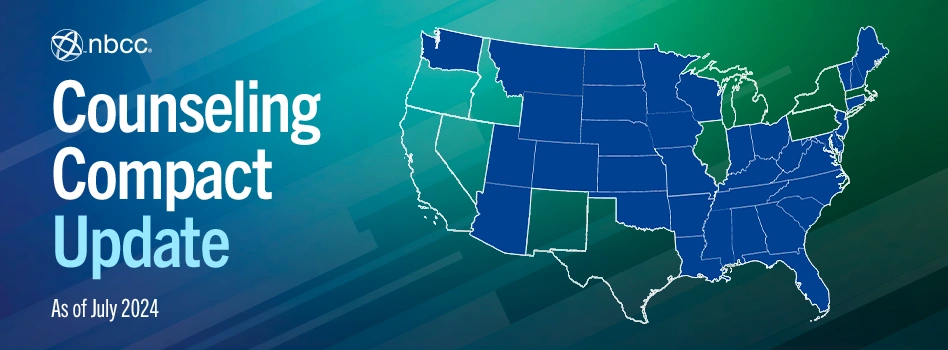
States that have enacted compact legislation:
AL, AR, AZ, CO, CT, DE, FL, GA, IA, IN, KS, KY, LA, MD, ME, MN, MO, MS, MT, NC, NJ, ND, NE, NH, OH, OK, RI, SC, SD, TN, UT, VA, VT, WA, WI, WV, and WY.
The Counseling Compact continues to move swiftly, with 37 states joining since 2021. The additional states to join so far in 2024 are Arizona, Minnesota, New Jersey, Rhode Island, South Carolina, and South Dakota. This article addresses some common questions regarding the compact.
When will the Counseling Compact open the application process and begin issuing privileges to practice?
The answer to this question lies in the process an occupational licensure compact must go through to prepare to issue privileges, which includes the creation of a robust and functional data system. The data system will enable counselors to apply for privileges to practice in the compact states and will allow these states to share all necessary information about the licensees. The Counseling Compact is currently developing this system, and it is expected that applications will open sometime in 2025.
To share the cost of development, the Counseling Compact partnered with two additional occupational licensure compact commissions, Audiology Speech-Language Pathology and Occupational Therapy, to create a shared data system. It is currently in development, and you can learn more about the system, get updates, and follow the progress at CompactConnect.org.
Once the data system is ready, the state onboarding time—the time for a particular state to be ready to communicate with the system to approve privileges—will depend on each state’s resources and existing state data systems. If a state has a newer or more technologically advanced licensing system, they will likely be able to onboard more quickly. Those that need to update systems to communicate with the compact data system may need more time to onboard.
The compact will be officially operational when at least two states have onboarded and applications can be processed for those states. Over time, all states that have passed compact legislation will onboard and the compact will operate as intended, making it easier to work with clients across state lines in addition to other benefits. Counselors will apply for a privilege through the Compact Commission website.
How much will a privilege to practice cost?
The Compact Commission is working diligently to answer this question and provide information and guidance to the compact states. It is expected that each state will charge a fee in addition to the standard Compact Commission fee (state fee + Compact Commission fee = total Privilege to Practice fee).
Each state will determine its own fee based on the state’s expenses. The compact will charge a fee to cover database and administrative costs. All fees will be paid via the application process on the Compact Commission website. At this time, it is not possible to speculate on the cost of privileges, but the intention is that fees will be reasonable and affordable for all practitioners who wish to participate in the compact.
How can I keep informed of the Counseling Compact status?
Throughout the past year, the various compact committees have been meeting regularly to move the compact forward via items such as choosing a vendor to build the data system and adopting rules for the Compact Commission. The committees currently in place are Executive, Rules, and Finance. Compliance and Elections committees are currently being established. The next full commission meeting will be a virtual meeting on Oct. 8, 2024.
All meetings are public, and notices and documents will be posted on the commission's website.
NBCC is proud to be an ex-officio member of the Compact Commission along with the American Counseling Association (ACA), American Mental Health Counselors Association (AMHCA), and the American Association of State Counseling Boards (AASCB).
We will continue to represent and bring the latest updates to NCCs and the counseling profession as the compact evolves and moves closer to counselors gaining privileges to practice in compact states. In addition, we are actively engaged in helping additional states and districts pass compact legislation. Learn more about the Counseling Compact and keep up with the latest news at our Grassroots Action Center.